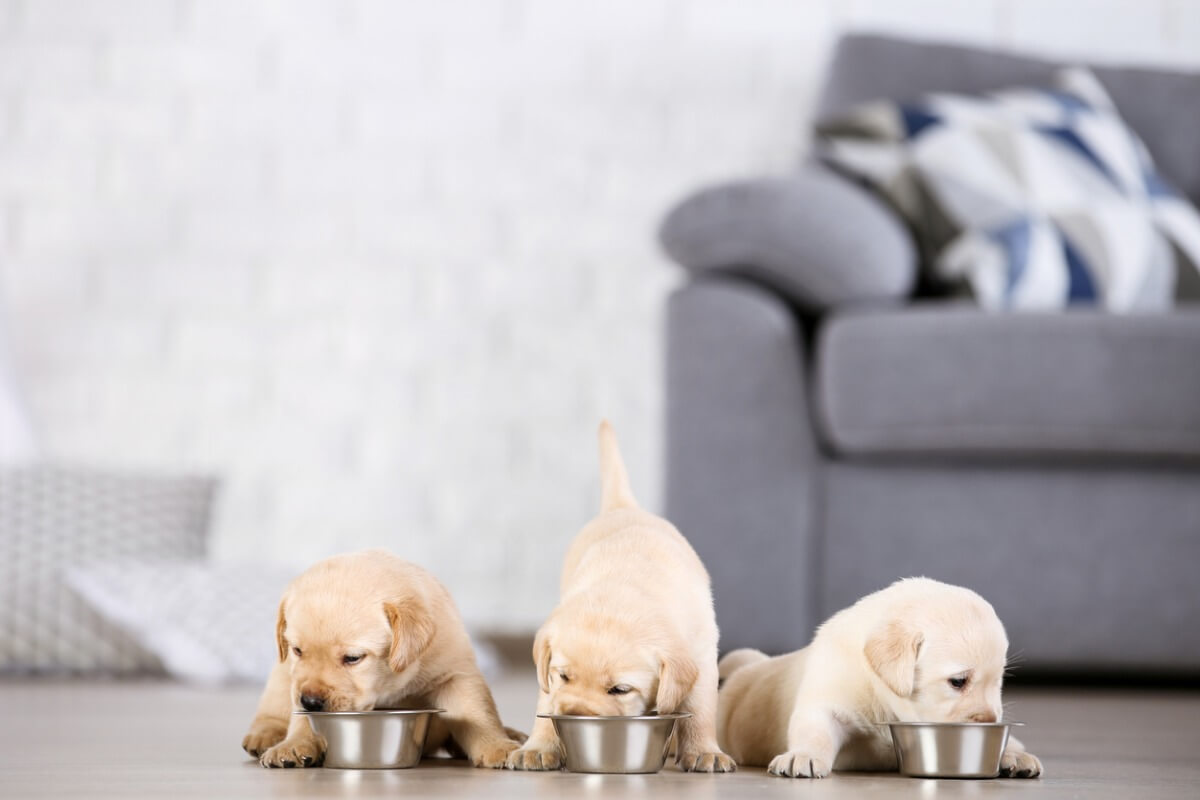17 Things a Puppy Needs


Reviewed and approved by the biologist Samuel Sanchez
The decision to adopt a puppy brings with it several responsibilities. It’s not only an exciting event, but also a change that requires more than just wanting to have a new addition for the family. Therefore, this article tells you about 17 things a puppy needs to live comfortably, safely, and enjoyably at home.
It’s important to think about your pet’s well-being and to help to provide for their needs in order to keep them healthy and happy. In this sense, you should keep in mind that care and affection are also fundamental aspects in your pet’s life. Below, you can find out what other items are essential for the puppy.
Things a puppy needs
The process of adaptation of the puppy to a new home includes a number of significant changes in their environment. So, having things like a safe place to rest, good food, toys, and training can make all the difference in helping your puppy settle into its routine. Keep all of these requirements in mind before you get a dog.
1. Nameplate
For starters, the puppy should have a nameplate that has its name on it, and also yours. It’s also important that this element has a phone number so that people can contact you if your dog gets lost.
On the other hand, thanks to technological advances, microchipping is also an option. This mechanism will help you to locate your pet more quickly if it leaves home without you noticing, or gets lost while on a walk. Consult a veterinarian about this alternative.
2. Bed and blanket
Having a place to rest is crucial for the dog. Therefore, you must ensure that your puppy has an appropriate bed for its size in which it can sleep comfortably. It’s recommended that this is made of soft fabric and the filling covered with waterproof material.
Similarly, the bed should be located in a safe area of the house, where the puppy can feel calm and can rest without fear. In addition, your dog will need a blanket, especially for use on cold days or wintertime.
3. Feeding bowl
Your puppy also needs a good bowl, and needs to learn about its purpose and how to eat from it correctly. You should get them a good quality bowl (for example, stainless steel) that fits the dog’s characteristics and needs.

4. Drinking bowl
Your four-legged friend will also need a drinking bowl to stay hydrated. They need to be able to drink clean, fresh water whenever they want. This is even more important during the summer, when your puppy could suffer from heat stroke.
5. Quality food
Another thing a puppy needs is related to its diet. It’s essential to provide your puppy with quality food, understanding that what they consume could impact positively or negatively on their body and health.
Puppy food should be proportional to characteristics such as weight, size, and health status. Therefore, it’s vital that a professional in the field should be responsible for advising you to get appropriate quality food for your dog.
6. Treats or rewards
In addition to the above, treats are essential in a puppy’s training. This is because they can motivate them to comply with the orders or tasks assigned to them. These rewards should be natural, i.e., pieces of fruit, vegetables, or even cookies that won’t be harmful to the dog’s health.
7. Collar and leash
We recommend that from very young your dog gets used to wearing a collar. You can start the process by putting it on while they’re asleep or playing. This should also be comfortable and safe for your pet, and a harness is a good option to avoid hurting or injuring their neck when you pull them.
Apart from the collar, the puppy needs a leash to ensure a safe walk without the risk of them straying. Be careful when choosing the leash, because it should be comfortable for your four-legged friend, and also for you.
8. Stool bags
The bag dispenser and stool bags are also things you need if you have a puppy at home. As a responsible owner, you should always pick up after your dog when he goes outside to relieve himself. In that order of ideas, these implements will help you to comply with the work of maintaining the hygiene of the environment.
9. Carrier
Another of the things your puppy needs is a carrier, which will help you to take them with you from one place to another, especially for vet visits in the car. Be careful in choosing one with the correct measurements so your dog has plenty of room to move.
10. Toys
Toys are very important for dogs as they love to have fun. Also, while they’re still puppies, dogs tend to chew because their teeth are growing and cause them discomfort. Having some objects to entertain them could prevent them from damaging other things in the house.
11. Cleaning products
Good hygiene is essential to prevent your puppy from getting infections, bacteria or diseases. For this reason, you’ll need to get suitable products to facilitate your pet’s hygiene routine. These should be specific grooming items for dogs.
Towels, shampoo, conditioner, nail clippers and combs are products you’ll need to keep your pet clean and looking good. This cleaning should be carried out according to how dirty the dog is and taking into account characteristics, such as the type of fur.
12. Visiting the vet
Having the opinion of a professional regarding your pet’s development is vital, so a visit to the vet is also part of the things your puppy needs. In addition to a general checkup, this person will be able to answer questions about issues such as the implantation of the microchip and deworming.
13. Deworming and vaccinations
Both the process of deworming and compliance with the vaccination schedule are essential in the life of a dog. These will help your puppy to be less prone to suffer some complications or diseases. These are procedures that must be carried out by a veterinarian.
14. Education and training
To work on obedience in your pet, training is essential. If you teach your canine from very young, they’ll probably find it easy to follow your commands for the rest of their life. This will deter them from misbehaving.
15. A routine
In addition to getting a number of objects for the puppy’s life, it’s recommended that you establish a routine that they can adapt to little by little. Establishing times for walking, feeding or playing will help your dog have a better way of life, even though it may take them a while to learn.
16. Time and attention
Taking care of a dog is not just about buying material things, because the puppy also requires your attention. In other words, if you want to keep a dog at home, make sure you have enough time to take care of its needs and always look after its well-being. If not, your dog may not live happily and comfortably.
17. Patience and affection
Finally, apart from giving them time, keep in mind that your four-legged friend will need affection. It’s important for you to set aside time to pet or pamper them. Dogs are generally very affectionate animals, especially with their family members.

In summary, having a puppy is a privilege, but also a responsibility. It’s not just about you and your desire for companionship. Adopting a dog also means making a commitment to provide security, peace of mind and comfort to an animal that will become your faithful friend.
The decision to adopt a puppy brings with it several responsibilities. It’s not only an exciting event, but also a change that requires more than just wanting to have a new addition for the family. Therefore, this article tells you about 17 things a puppy needs to live comfortably, safely, and enjoyably at home.
It’s important to think about your pet’s well-being and to help to provide for their needs in order to keep them healthy and happy. In this sense, you should keep in mind that care and affection are also fundamental aspects in your pet’s life. Below, you can find out what other items are essential for the puppy.
Things a puppy needs
The process of adaptation of the puppy to a new home includes a number of significant changes in their environment. So, having things like a safe place to rest, good food, toys, and training can make all the difference in helping your puppy settle into its routine. Keep all of these requirements in mind before you get a dog.
1. Nameplate
For starters, the puppy should have a nameplate that has its name on it, and also yours. It’s also important that this element has a phone number so that people can contact you if your dog gets lost.
On the other hand, thanks to technological advances, microchipping is also an option. This mechanism will help you to locate your pet more quickly if it leaves home without you noticing, or gets lost while on a walk. Consult a veterinarian about this alternative.
2. Bed and blanket
Having a place to rest is crucial for the dog. Therefore, you must ensure that your puppy has an appropriate bed for its size in which it can sleep comfortably. It’s recommended that this is made of soft fabric and the filling covered with waterproof material.
Similarly, the bed should be located in a safe area of the house, where the puppy can feel calm and can rest without fear. In addition, your dog will need a blanket, especially for use on cold days or wintertime.
3. Feeding bowl
Your puppy also needs a good bowl, and needs to learn about its purpose and how to eat from it correctly. You should get them a good quality bowl (for example, stainless steel) that fits the dog’s characteristics and needs.

4. Drinking bowl
Your four-legged friend will also need a drinking bowl to stay hydrated. They need to be able to drink clean, fresh water whenever they want. This is even more important during the summer, when your puppy could suffer from heat stroke.
5. Quality food
Another thing a puppy needs is related to its diet. It’s essential to provide your puppy with quality food, understanding that what they consume could impact positively or negatively on their body and health.
Puppy food should be proportional to characteristics such as weight, size, and health status. Therefore, it’s vital that a professional in the field should be responsible for advising you to get appropriate quality food for your dog.
6. Treats or rewards
In addition to the above, treats are essential in a puppy’s training. This is because they can motivate them to comply with the orders or tasks assigned to them. These rewards should be natural, i.e., pieces of fruit, vegetables, or even cookies that won’t be harmful to the dog’s health.
7. Collar and leash
We recommend that from very young your dog gets used to wearing a collar. You can start the process by putting it on while they’re asleep or playing. This should also be comfortable and safe for your pet, and a harness is a good option to avoid hurting or injuring their neck when you pull them.
Apart from the collar, the puppy needs a leash to ensure a safe walk without the risk of them straying. Be careful when choosing the leash, because it should be comfortable for your four-legged friend, and also for you.
8. Stool bags
The bag dispenser and stool bags are also things you need if you have a puppy at home. As a responsible owner, you should always pick up after your dog when he goes outside to relieve himself. In that order of ideas, these implements will help you to comply with the work of maintaining the hygiene of the environment.
9. Carrier
Another of the things your puppy needs is a carrier, which will help you to take them with you from one place to another, especially for vet visits in the car. Be careful in choosing one with the correct measurements so your dog has plenty of room to move.
10. Toys
Toys are very important for dogs as they love to have fun. Also, while they’re still puppies, dogs tend to chew because their teeth are growing and cause them discomfort. Having some objects to entertain them could prevent them from damaging other things in the house.
11. Cleaning products
Good hygiene is essential to prevent your puppy from getting infections, bacteria or diseases. For this reason, you’ll need to get suitable products to facilitate your pet’s hygiene routine. These should be specific grooming items for dogs.
Towels, shampoo, conditioner, nail clippers and combs are products you’ll need to keep your pet clean and looking good. This cleaning should be carried out according to how dirty the dog is and taking into account characteristics, such as the type of fur.
12. Visiting the vet
Having the opinion of a professional regarding your pet’s development is vital, so a visit to the vet is also part of the things your puppy needs. In addition to a general checkup, this person will be able to answer questions about issues such as the implantation of the microchip and deworming.
13. Deworming and vaccinations
Both the process of deworming and compliance with the vaccination schedule are essential in the life of a dog. These will help your puppy to be less prone to suffer some complications or diseases. These are procedures that must be carried out by a veterinarian.
14. Education and training
To work on obedience in your pet, training is essential. If you teach your canine from very young, they’ll probably find it easy to follow your commands for the rest of their life. This will deter them from misbehaving.
15. A routine
In addition to getting a number of objects for the puppy’s life, it’s recommended that you establish a routine that they can adapt to little by little. Establishing times for walking, feeding or playing will help your dog have a better way of life, even though it may take them a while to learn.
16. Time and attention
Taking care of a dog is not just about buying material things, because the puppy also requires your attention. In other words, if you want to keep a dog at home, make sure you have enough time to take care of its needs and always look after its well-being. If not, your dog may not live happily and comfortably.
17. Patience and affection
Finally, apart from giving them time, keep in mind that your four-legged friend will need affection. It’s important for you to set aside time to pet or pamper them. Dogs are generally very affectionate animals, especially with their family members.

In summary, having a puppy is a privilege, but also a responsibility. It’s not just about you and your desire for companionship. Adopting a dog also means making a commitment to provide security, peace of mind and comfort to an animal that will become your faithful friend.
All cited sources were thoroughly reviewed by our team to ensure their quality, reliability, currency, and validity. The bibliography of this article was considered reliable and of academic or scientific accuracy.
- Guía para entender al perro. Fundación para el Asesoramiento y Acción en defensa de los Animales (FAADA). Recogido el 12 de noviembre de 2021 de: https://www.google.com/url?sa=t&source=web&rct=j&url=http://faada.org/docs/GuiaParaEntenderAlPerro.pdf&ved=2ahUKEwjClv-ZtJb0AhU-RDABHe-nDWcQFnoECAUQAQ&usg=AOvVaw1tpvd2dI-4kaASWrgkSK_0
- Órdenes básicas de obediencia. Fundación affinity. Recogido el 12 de noviembre de 2021 de: https://www.google.com/url?sa=t&source=web&rct=j&url=https://www.fundacion-affinity.org/sites/default/files/ordenes_obediencia_a4.pdf&ved=2ahUKEwjJgue1upz0AhXkTDABHXeNA3AQFnoECDcQAQ&usg=AOvVaw1Bf2rgkSg1DB1QYJC5Qyul
This text is provided for informational purposes only and does not replace consultation with a professional. If in doubt, consult your specialist.








